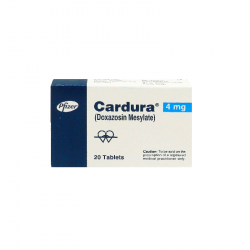Cardura (doxazosin) Coupons, Discounts & Cost
Cardura (doxazosin) is a selective alpha1-receptor blocker. One way to save money on the Cardura (doxazosin) retail cost regardless of income and insurance status is to use Cardura (doxazosin) coupons or discount cards from RXCoupons. Use this Cardura (doxazosin) coupon at this online pharmacy and receive up to 75% off the sale price.
Description of the active ingredient
Cardura (doxazosin) is a selective alpha1-receptor blocker. Doxazosin is an antihypertensive substance used for urination disorders associated with benign prostatic hyperplasia.
Indications for use of the Cardura (doxazosin)
Cardura (doxazosin) is indicated for the treatment of hypertension (in combination therapy), benign prostatic hyperplasia (BPH) and other symptoms associated with BPH.
Cardura (doxazosin) contraindications
The drug is contraindicated in liver failure (severe form), anuria, bladder stones, urinary tract infections, obstruction of the upper urinary tract, hypotension and tendency to orthostatic disorders, glucose-galactose malabsorption, lactose intolerance, lactase deficiency, hypersensitivity to doxazosin. The drug is not used in patients up to 18 years.
Use Cardura with caution in elderly patients and patients with aortic and mitral stenosis, heart failure, right ventricular failure (associated with exudative pericarditis or pulmonary embolism), left ventricular failure, stroke, liver failure. It is possible to use Cardura during pregnancy and lactation if the expected effect of therapy considerably outweighs the potential risk to the fetus or child.
Cardura (doxazosin) dosage
The tablets are taken orally 1 time a day, in the morning or evening.
Recommended daily dosage:
Hypertension: 1 mg 1 time per day during the first 1-2 weeks. After that, the daily dose is gradually increased (up to 2 mg, 4 mg, 8 mg). The average dose is of 2-4 mg per day, the maximum - 16 mg.
Benign prostatic hyperplasia: the initial dose is administered in the amount of 1 mg. The doses should be increased with 1-2 week intervals. The average daily dose is 2-4 mg, the maximum dose - 8 mg.
In combination therapy with diuretics or other antihypertensive agents: Cardura dose must be changed according to the tolerability and condition of the patient. In case of interruption in dosing, it is necessary to start with the initial dose.
Elderly patients and those with renal insufficiency should take the same doses. Patients with impaired hepatic function should use reduced doses of the drug.
Cardura (doxazosin) adverse reactions
Cardura (doxazosin) may frequently cause the following side effects:
Nervous system: drowsiness, postural dizziness (a sharp decrease in blood pressure while taking the first dose of the drug), very often - dizziness, headache, paresthesia, tremor, hypoesthesia.
Cardiovascular system: rarely - postural hypotension, reduction in blood pressure.
Hematopoietic system: rarely - thrombocytopenia, leukopenia.
Urinary tract: rarely - polyuria, frequent urination, urinary incontinence, very rarely - dysuria, nocturia, hematuria.
Reproductive system: very rarely - impotence, priapism, gynecomastia, very rarely - retrograde ejaculation.
Respiratory system: rhinitis, shortness of breath, rarely - nosebleeds, cough, very rarely - bronchospasm.
Digestive system: nausea, dry mucous membranes, abdominal pain, dyspepsia, diarrhea, rarely - vomiting, flatulence, constipation, very rare - hepatitis, cholestasis, jaundice.
Immune system: very rarely - anaphylactic reactions.
Musculoskeletal system: rarely - back pain, arthralgia, muscle cramps, myalgia, muscle weakness.
Allergic reactions: rarely - itching, rash, alopecia, purpura, very rarely - urticaria.
Other reactions: fatigue, asthenia, leg edema, chest pain, palpitations, tachycardia, insomnia, anxiety, agitation, depression, rarely - arrhythmia, angina pectoris, myocardial infarction, very rarely - bradycardia.
Cardura in benign prostatic hyperplasia may cause the same side effects as in patients with arterial hypertension.
Cardura (doxazosin) special instructions
Cardura (doxazosin) may cause postural hypotension in the form of weakness, dizziness, and sometimes loss of consciousness (especially at the beginning of therapy). It is necessary to know about the possibility of orthostatic hypotension (especially during exercise and in the case of alcohol dependence).
The drug should be used with extreme caution in elderly patients, as the risk of orthostatic hypotension and dizziness increases with age.

